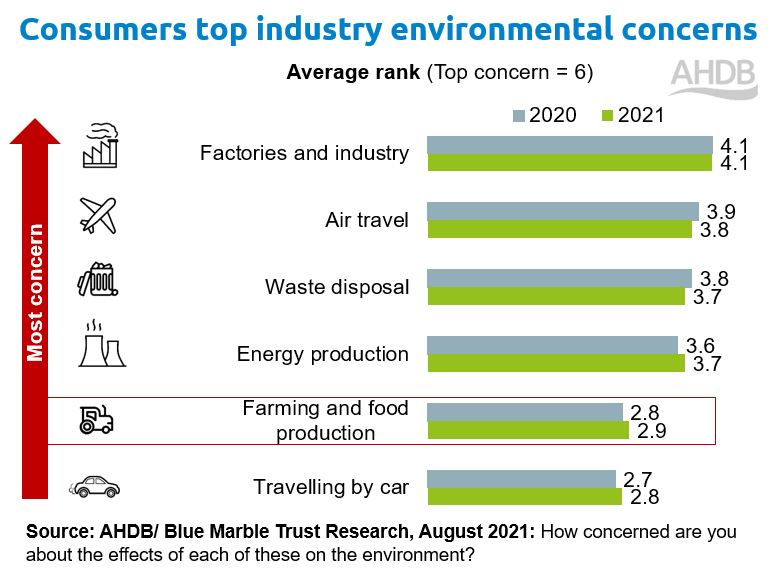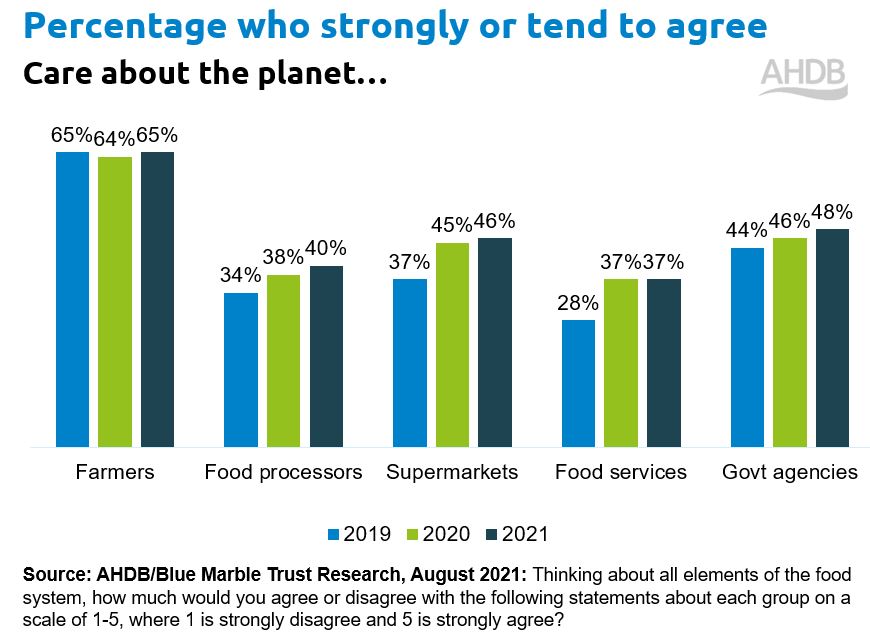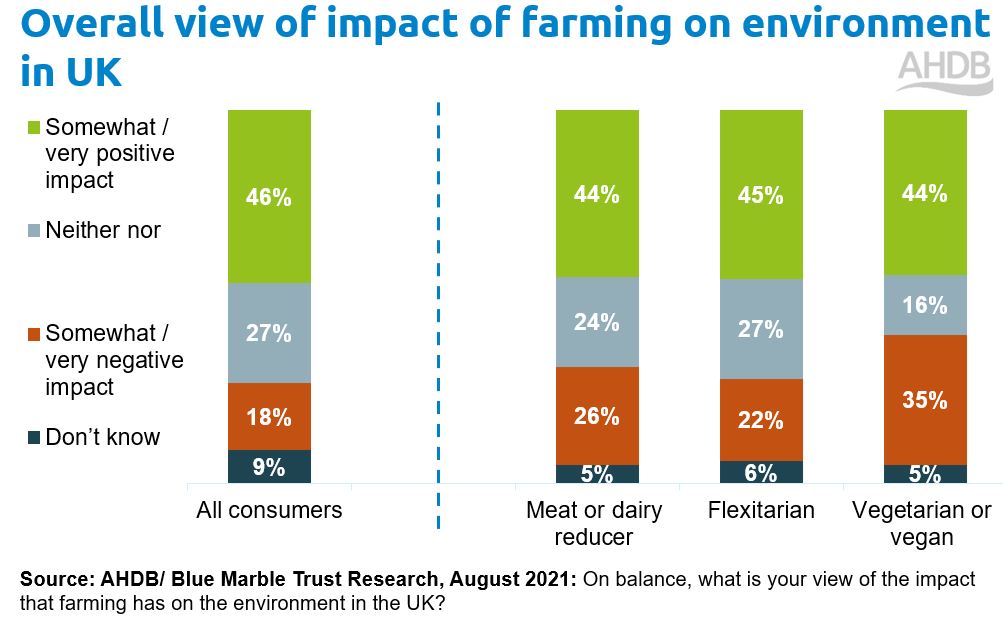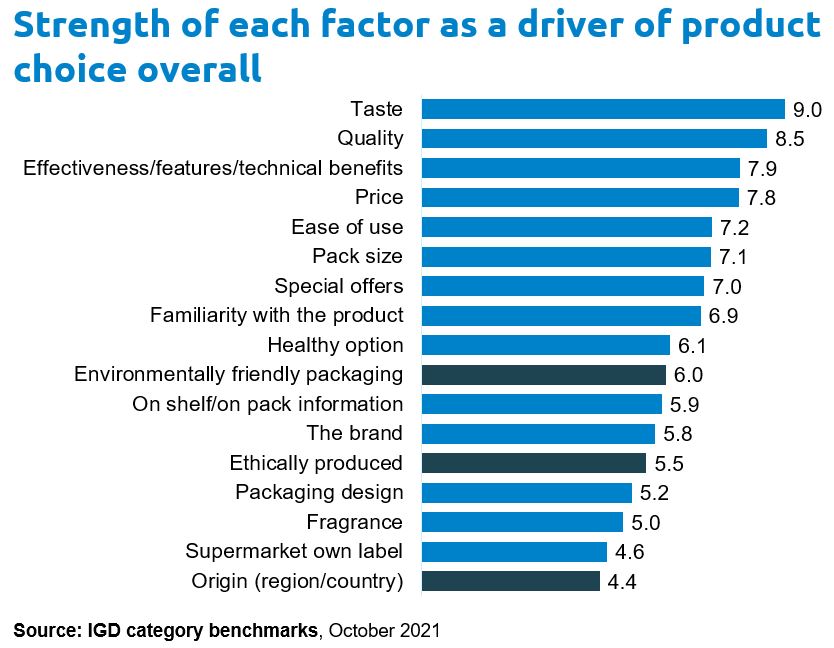The environmental impact of farming - consumer perceptions
Tuesday, 1 February 2022
AHDB’s recent trust and transparency research conducted by Blue Marble in August 2021, found that the environment is important to 48% of consumers when choosing food.
In terms of environmental considerations when choosing food, avoiding plastic and packaging comes out on top, followed by wider considerations such as choosing foods that are in season, avoiding factory farmed foods, and reducing food miles (AHDB/Blue Marble, August 2021). However, 49% of shoppers say it’s the retailer’s responsibility to only sell sustainable products, not theirs to only buy sustainably, and 60% of shoppers say retailers should simply not sell out-of-season foods if they cause higher greenhouse gas emissions (IGD, November 2021).
The amount of packaging on a food or grocery product and its impact on the environment follow a similar trend in terms of importance to the shopper (IGD, October 2021). Plastic packaging is often one of the top consumer considerations as it’s something the consumer can control. And easily switching to alternatives can make them feel like they are doing their bit for the environment. Retailers and supply chain are responding to this in a variety of product categories, for instance, trialling refill concepts in store and reducing or removing unnecessary plastic packaging.
Environment and the agricultural industry
When it comes to consumer concern towards industry environmental impact, farming and food production sits in fifth place, behind factories, air travel, waste disposal, and energy production. Interestingly, farming and food production ranks higher in terms of environmental concern amongst consumers who follow a vegetarian or vegan diet with 20% claiming it is their top concern (AHDB/Blue Marble, August 2021).
Our research found that farmers continue to be the most trusted part of the food supply chain. On top of this, 65% of consumers agree that farmers care about the planet, which is the highest score within the food supply chain (AHDB/Blue Marble, August 2021).
Looking specifically at UK farming practices, just under half (46%) of consumers agree that farming has a somewhat or very positive impact on the UK environment (AHDB/Blue Marble, August 2021). It is also interesting to note, that at a total level 18% of consumers view UK farming to have a somewhat/very negative impact on the environment, we see rises in this negative perception depending on consumer dietary choice. For instance, when we filter the data by claimed consumer diet, meat or dairy reducers (26%), and vegetarians or vegans (35%) are more likely to agree UK farming has a somewhat/very negative impact on the environment. Therefore, communicating the environmental initiatives that are being implemented in the agricultural industry could help ease consumer concerns and help maintain or even grow the positive perception of UK farming.
There are also wider concerns around the environmental impact of importing foods from abroad, with 54% of consumers somewhat or very concerned about the environmental impact of importing meat and dairy products from countries like Australia, New Zealand, and the US (AHDB/Blue Marble, August 2021). Although over half of consumers are concerned about the environmental impact of importing food products to the UK, the environmental credentials of food sit further down the consumers priority list when choosing what to eat, with taste, quality, and price being the key factors that drive the overall product choice.
So, what would the consumer like to know?
Consumers are increasingly being subjected to often negative information about where their food comes from and how its produced, but there are signs that they would like to see greater transparency when choosing food to aid their decision making. 87% would find it helpful to have labelling on how and where animals are raised and 81% would find sustainability labelling such as food miles or the carbon footprint of a product helpful (AHDB/Blue Marble, August 2021). However, as it stands, without an industry agreed measure on product credentials like carbon footprint or sustainability, labelling could be misleading or cause confusion.
Key opportunities
- Consumers agree that within the food industry, farmers care about the planet, therefore farmers can play a pivotal role in building positive sustainability stories in the food and farming industry, by communicating on farm initiatives and practices used in the UK to become more sustainable
- Provide consumers with environmental evidence to allow them to have positive conversations about meat and dairy. You can check out the AHDB assets available for free here
- Work towards differentiating UK production methods from the rest of the world. For instance, the difference between grass reared beef and lamb compared to intensive practices such as feed lots
- Provide transparency where possible around where and how food is produced
Sign up for regular updates
You can subscribe to receive the consumer insight newsletter straight to your inbox. Simply fill in your contact details on our online form
While AHDB seeks to ensure that the information contained on this webpage is accurate at the time of publication, no warranty is given in respect of the information and data provided. You are responsible for how you use the information. To the maximum extent permitted by law, AHDB accepts no liability for loss, damage or injury howsoever caused or suffered (including that caused by negligence) directly or indirectly in relation to the information or data provided in this publication.
All intellectual property rights in the information and data on this webpage belong to or are licensed by AHDB. You are authorised to use such information for your internal business purposes only and you must not provide this information to any other third parties, including further publication of the information, or for commercial gain in any way whatsoever without the prior written permission of AHDB for each third party disclosure, publication or commercial arrangement. For more information, please see our Terms of Use and Privacy Notice or contact the Director of Corporate Affairs at info@ahdb.org.uk © Agriculture and Horticulture Development Board. All rights reserved.
Topics:
Sectors:
Tags:





